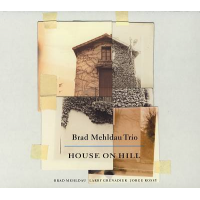Home » Jazz Articles » Album Review » Brad Mehldau: House On Hill
Brad Mehldau: House On Hill
The heir apparent to such impressionist masters as Bill Evans and Keith Jarrett, Mehldau has emerged as one of today's most distinctive voices. Prodigiously talented, with boundless imagination and a fiendish knack for interpreting contemporary material (from the Beatles and Paul Simon to Radiohead and Nick Drake), he is also knowingly respectful of tradition.
Eschewing standards for a set of all-original compositions, Mehldau culled these pieces primarily from the session that begat his 2004 covers album, Anything Goes (Warner Bros.). As his impressively thorough (some would say exhaustive) liner notes illuminate, these pieces fall tenuously under the banner of the theme and variations model—the classic head-solo-head format. Nonetheless, this veteran trio approaches these pieces with brazen harmonic invention and rhythmic verve.
Mehldau's singular writing is intricate and harmonically complex without ever being cerebrally impenetrable. However, his esoteric impressionism occasionally lacks the abstract vivaciousness he brings to the familiar cover tunes he artfully reinterprets. Never confrontational by design, these alluring but knotty originals have an air of reserved formality on first listen.
Multiple listens reveal numerous layers and subtle surprises. Chord modulations are regularly alternated with percussive eighth-note figures and expansive arpeggios; Mehldau's Baroque-influenced contrapuntal streams force Rossy into unique drum patterns. Stalwart bassist Larry Grenadier's harmonic counterpoint follows in the footsteps of melodic interpreters like Scott LaFaro, shading and embellishing Mehldau's circuitous statements with his own.
The rhythm section varies its approach with subtle invention. The elegant title track borrows a Latin vamp for support, while the buoyant "Happy Tune" liberally employs an understated, funky bass ostinato. "Bealtine" recalls the halcyon days of the 1960s Impulse! era with a propulsive, simmering modal waltz. "Fear and Trembling" exudes an icy veneer that drives headlong into stark territory reminiscent of Miles Davis' second quintet. Alluding to its title, "Boomer" rides a loose, rollicking backbeat; Mehldau's contrapuntal, left hand chord arpeggios engage in a discursive conversation with his right hand's meandering melodic variations.
Although House On Hill may not rise to the conceptual highs of Day Is Done, it is an impressive document from an artist who continues to refine himself.
Track Listing
August Ending; House On Hill; Bealtine; Boomer; Backyard; Fear and Trembling; Embers; Happy Tune; Waiting For Eden.
Personnel
Brad Mehldau
pianoBrad Mehldau: piano; Larry Grenadier: bass; Jorge Rossy: drums.
Album information
Title: House on Hill | Year Released: 2006 | Record Label: Nonesuch Records
Tags
PREVIOUS / NEXT
Brad Mehldau Concerts
Brad Mehldau with the HR Big Band @ hr-Sendesaal
Hr-sendesaal - Hessischer RundfunkFrankfurt am Main, Germany
Support All About Jazz
 All About Jazz has been a pillar of jazz since 1995, championing it as an art form and, more importantly, supporting the musicians who make it. Our enduring commitment has made "AAJ" one of the most culturally important websites of its kind, read by hundreds of thousands of fans, musicians and industry figures every month.
All About Jazz has been a pillar of jazz since 1995, championing it as an art form and, more importantly, supporting the musicians who make it. Our enduring commitment has made "AAJ" one of the most culturally important websites of its kind, read by hundreds of thousands of fans, musicians and industry figures every month.




















